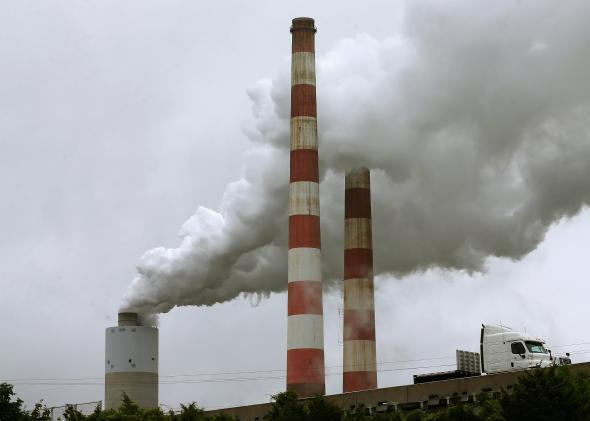Republicans have two action items for how they’re going to push back against President Obama’s emissions deal with China.
After Senate leadership elections on Thursday, Oklahoma Republican Sen. Jim Inhofe—a top opponent of legislation intended to curb climate change and the next chair of the Senate Environment and Public Works Committee—explained the steps his caucus will take.
“The whole thing, it’s such a fraud,” said Inhofe, arguing nobody will be able to keep China from growing its emissions after 2030.
“It’s the same thing as during the Clinton-Gore administration in 1998, going down to Rio De Janeiro and saying, ‘Yes, we’re going to sign the Kyoto Treaty, we’re going to take it back,’ knowing that it would not happen, knowing that it would not be submitted for ratification,” he continued. “That’s the same thing that he did. Same thing, exactly.”
So Congressional Republicans will look to block new EPA regulations, using the Congressional Review Act. Inhofe said they will also look to use the normal legislative process to overturn older regulations.
That first point is interesting, as, per a Government Accountability Office FAQ, only one regulation has previously been overturned via the Congressional Review Act. If the soon-to-be-sworn-in Republican Congress can use that law to strike down EPA regulations, that would be significant, but it would also require the support of a lot of Democrats. The Congressional Review Act lets the Senate vote against new regulations without needing to have a cloture vote first. To stop a regulation, the Act requires that both chambers pass resolutions calling for that to happen. The resolutions would require the president’s signature, though, unless they pass by two-thirds-majority votes in both chambers.
In the next Congress, Republicans will hold at least 53 Senate seats (54 in the likely case that Louisiana Democrat Mary Landrieu loses her December runoff), which means they would need to pick up at least 13 or 14 Democrats to get the two-thirds majority necessary. There will be at least 244 Republicans in the House in the 114th Congress, so they would need to pick up around 46 Democrats to have a two-thirds vote. So it seems unlikely that Congressional Republicans will use this strategy to successfully overturn any regulations, however it could be a valuable political tool, because it will get House and Senate Democrats on the record voting for regulations that could then be characterized in campaign ads as job killers.
Getting the GOP votes shouldn’t be a problem. Republicans haven’t been shy in the least about their disapproval of the president’s climate agreement. Senate Minority Leader Mitch McConnell—who will be the head of that chamber in the next Congress—released a statement on Wednesday criticizing “the president’s ideological War on Coal.”
“Easing the burden already created by EPA regulations will continue to be a priority for me in the new Congress,” he said.
And Louisiana Republican David Vitter, currently the top Republican Senator on the Environment and Public Works Committee, quickly made a dig at the deal.
“There’s nothing ‘breakthrough’ about Obama’s attempt to pass failed policy, or having China tell us that maybe in 15 years they’ll try to reduce their emissions,” he said in a statement.
Republicans’ main line of argument through this will be that China won’t hold up its end of the climate deal and, meanwhile, that new EPA regulations will hurt the American economy.
